4-HYDROXYPHENOXYACETIC ACID
- CAS NO.:1878-84-8
- Empirical Formula: C8H8O4
- Molecular Weight: 168.15
- MDL number: MFCD00014362
- EINECS: 217-525-8
- SAFETY DATA SHEET (SDS)
- Update Date: 2023-07-14 17:42:33
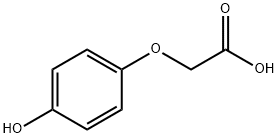
What is 4-HYDROXYPHENOXYACETIC ACID?
Chemical properties
off-white to beige fine crystalline powder
The Uses of 4-HYDROXYPHENOXYACETIC ACID
2-(4-Hydroxyphenoxy)acetic Acid is used in the design, synthesis and evaluation of postulated transient intermediate and substrate analogues as inhibitors of 4-hyroxyphenylpyruvate dioxygenase. Acts as a reagent in the preparation, anti-HIV and kinesin Eg5 inhibitory activities, QSAR, and modeling studies of triazolothiadiazole and triazolothiadiazine derivatives. Synthesis of thiadiazolotriazin-4-ones and study of their mosquito-larvicidal and antibacterial properties.
Definition
ChEBI: 4-Hydroxypheoxyacetate is a monocarboxylic acid.
General Description
(4-Hydroxyphenoxy)acetic acid along with formaldehyde ammonium salt forms a polyaromatic anionic compound RG-13577. RG-13577 mimics the synthetic heparin and specifically binds to the vascular smooth muscle cells (SMCs) and inhibits their proliferative growth. In the molecules of (4-hydroxyphenoxy)acetic acid, the carboxyl groups are held together by R22(8) hydrogen bonds.
Properties of 4-HYDROXYPHENOXYACETIC ACID
| Melting point: | 154-157 °C (lit.) |
| Boiling point: | 372.6±17.0 °C(Predicted) |
| Density | 1.367±0.06 g/cm3(Predicted) |
| solubility | soluble in Methanol |
| form | Fine Crystalline Powder |
| pka | 3.27±0.10(Predicted) |
| color | Off-white to beige |
| BRN | 1952779 |
| CAS DataBase Reference | 1878-84-8(CAS DataBase Reference) |
| EPA Substance Registry System | Acetic acid, (4-hydroxyphenoxy)- (1878-84-8) |
Safety information for 4-HYDROXYPHENOXYACETIC ACID
| Signal word | Warning |
| Pictogram(s) |
 Exclamation Mark Irritant GHS07 |
| GHS Hazard Statements |
H315:Skin corrosion/irritation H319:Serious eye damage/eye irritation H335:Specific target organ toxicity, single exposure;Respiratory tract irritation |
| Precautionary Statement Codes |
P261:Avoid breathing dust/fume/gas/mist/vapours/spray. P264:Wash hands thoroughly after handling. P264:Wash skin thouroughly after handling. P271:Use only outdoors or in a well-ventilated area. P280:Wear protective gloves/protective clothing/eye protection/face protection. P302+P352:IF ON SKIN: wash with plenty of soap and water. P305+P351+P338:IF IN EYES: Rinse cautiously with water for several minutes. Remove contact lenses, if present and easy to do. Continuerinsing. |
Computed Descriptors for 4-HYDROXYPHENOXYACETIC ACID
New Products
4-AMINO-TETRAHYDRO-PYRAN-4-CARBOXYLIC ACID HCL 4-(Dimethylamino)tetrahydro-2H-pyran-4-carbonitrile 4-Aminotetrahydropyran-4-carbonitrile Hydrochloride (R)-3-Aminobutanenitrile Hydrochloride 3-((Dimethylamino)methyl)-5-methylhexan-2-one oxalate 1,4-Dioxa-8-azaspiro[4.5]decane 5-Bromo-2-nitropyridine Nimesulide BP Aceclofenac IP/BP/EP Diclofenac Sodium IP/BP/EP/USP Mefenamic Acid IP/BP/EP/USP Ornidazole IP Diclofenac Potassium THOMAIND PAPER PH 2.0 TO 4.5 1 BOX BUFFER CAPSULE PH 9.2 - 10 CAP SODIUM CHLORIDE 0.1N CVS ALLOXAN MONOHYDRATE 98% PLATINUM 0.5% ON 3 MM ALUMINA PELLETS (TYPE 73) LITHIUM AAS SOLUTION 2-Bromo-1-(bromomethyl)-3-chloro-5-nitrobenzene 2-Bromo-3-nitroaniline N-(3-Hydroxypropyl)-N-methylacetamide 3-Bromo-6-chloropyridazine 4-ethyl-3-nitrobenzoic acidRelated products of tetrahydrofuran


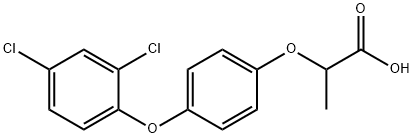
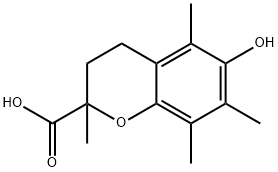

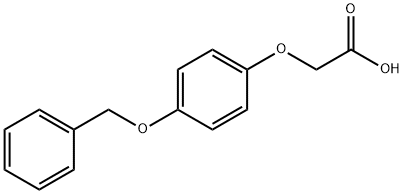
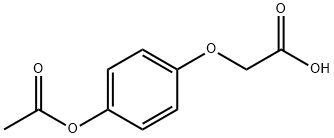
![3-CHLORO-2-(4-METHOXYPHENOXY)-4-[2-(4-NITROPHENYL)HYDRAZONO]BUT-2-ENOIC ACID](https://img.chemicalbook.in/StructureFile/ChemBookStructure2/GIF/CB2395861.gif)
You may like
-
 1878-84-8 4-hydroxy phenoxy aceticacid 98%View Details
1878-84-8 4-hydroxy phenoxy aceticacid 98%View Details
1878-84-8 -
 (4-Hydroxyphenoxy)acetic Acid CAS 1878-84-8View Details
(4-Hydroxyphenoxy)acetic Acid CAS 1878-84-8View Details
1878-84-8 -
 (4-Hydroxyphenoxy)acetic acid CAS 1878-84-8View Details
(4-Hydroxyphenoxy)acetic acid CAS 1878-84-8View Details
1878-84-8 -
 1823368-42-8 98%View Details
1823368-42-8 98%View Details
1823368-42-8 -
 2-(3-(tert-butyl)phenoxy)-2-methylpropanoic acid 1307449-08-6 98%View Details
2-(3-(tert-butyl)phenoxy)-2-methylpropanoic acid 1307449-08-6 98%View Details
1307449-08-6 -
 Ethyl 3-(furan-2-yl)-3-hydroxypropanoate 25408-95-1 98%View Details
Ethyl 3-(furan-2-yl)-3-hydroxypropanoate 25408-95-1 98%View Details
25408-95-1 -
 2-Chloro-5-fluoro-1-methoxy-3-methylbenzene 98%View Details
2-Chloro-5-fluoro-1-methoxy-3-methylbenzene 98%View Details
1805639-70-6 -
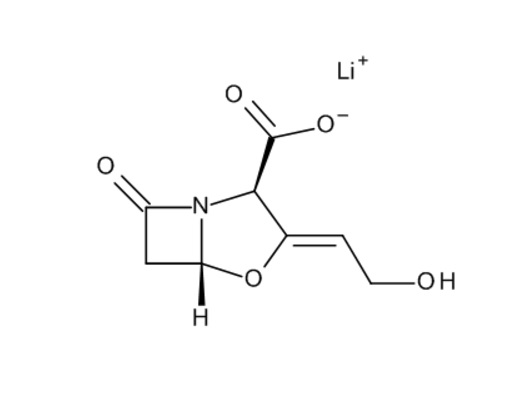 Lithium ClavulanateView Details
Lithium ClavulanateView Details
61177-44-4